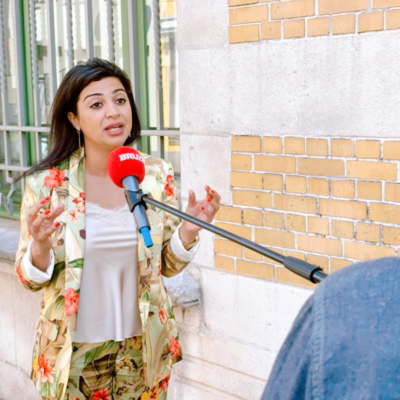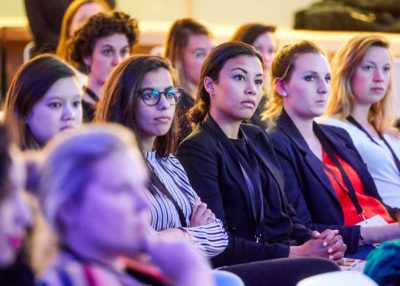
Digital entrepreneurship: (also) women's business
A few weeks ago, the documentary “Casser les codes (Break the Codes)” by journalist, author and director Safia Kessas was broadcast on RTBF. It sheds further light on the glaring absence of women in the field of information and communication technologies (ICT). In Brussels, there are growing calls to change the status quo. And lead the way.
Interviews with Julie Foulon from GIRLEEK & Assia Mezraui from BubbleTech.
Produced with the support of the BRIC, hub.brussels and Innoviris, among others, Safia Kessas‘ feature film tells the story of emblematic women in the tech sector.
By using role models, the director intends to raise women’s awareness of the accessibility and opportunities of STEM (Science – Technology – Engineering – Mathematics) professions, in a world where prejudice persists. But for many women already in the ecosystem, we need to go even further.
Less “pink washing”, more action
“We’ve been seeing this for 10 years; we have to act. Role models are a good thing, but as well as inspiring, we must take action,” says Julie Foulon, founder of GIRLEEK. Julie has been working in the tech industry for over ten years. “A lot of events are organised to take note of the problem, but not to address it. The result is a significant decline, globally, in the representation of women in STEM.”
Before co-creating MolenGeek in 2016, Julie launched her own digital marketing training agency, entirely dedicated to women, in 2011. “Women don’t know that they can get involved by these jobs; they don’t have access to information; they have to go and find it and do fieldwork to avoid remaining isolated.“
GIRLEEK offers free webinars three times a week to develop skills in a hands-on way. Everything is online so they can reach the widest possible audience.
Women, a false minority
“We always talk about assistance for minorities. But women are NOT a minority“, emphasises GIRLEEK’s founder. “We are rendered invisible although we make up half the world’s population and therefore deserve support in this respect.“
The same is true for Assia Mezraui, founder of the digital agency BubbleTech. “Digital is not accessible on the ground. For example, FFLs* are offered a whole range of training courses in the hotel and catering industry or childcare, whereas digital technology can be learned on the job, very quickly, without even needing to know the language of the country! Even among young people, digital technology has a bad image; that of a mind-numbing world reserved for geeks. In addition, there are no courses that address digital languages or programming in the high school curriculum.”
* French as a Foreign Language is the French language when taught to non-French speakers, for cultural, professional or tourist purposes.
“Ask Google”
Assia Mezraui took the coding route slightly by chance, after she lost her voice. After nodules developed on her vocal cords, Assia had to put her passion on hold. She filled this void with digital technology, “Ibrahim Ouassari, friend and co-founder of MolenGeek, challenged me by offering me an introduction to coding for people over 25. The first few classes were quite gruelling; I was bombarded with incomprehensible terms that I didn’t know what to do with. But everything started to make sense as the weeks went by. I felt myself progressing very quickly, it was exhilarating. Code is a language like any other, one I was very interested in understanding and using.“
From this passion, the web and design agency BubbleTech was created in 2019.
“EVERYTHING is on the web,” says Assia. “When my daughters ask me a specific question that I can’t answer, I always tell them, ‘Ask Google.’ The web is synonymous with emancipation; it is a key that opens countless doors for those who are willing to look.“
Being a mother has never held Assia back in her projects. “It’s a social impression that we have to choose. We have to get over certain ideas and taboos, without feeling guilty. The trick is to find a balance between your private life and your passion. It’s more difficult if you are not surrounded by your family, because there is nothing to encourage mothers to start a business or be able to take IT training with adapted schedules. Short development courses are very intense, the pace is very hard to keep up with, you really have to hang in there and want to make it work.”
The impostor syndrome
Nevertheless, impostor syndrome is still very common, especially among women: “A degree still prevails over experience, especially in the tech sector. To establish her legitimacy in digital technologies, a woman will have to prove herself more than a man, even if she has equal skills.“
However, Assia no longer has to prove herself, as word of mouth has established her reputation in a world that is still predominantly male. “But today, I can see that more and more women want to become entrepreneurs. There are still very few women in the tech industry; they are often found in the marketing, design or communication sectors but still not enough in web development and even fewer in certain branches such as artificial intelligence programming, cybersecurity and blockchain. In my session there were 13 boys and 4 girls, including me, and none of them continued in IT.“
Brussels, a good place to get started in digital technology
“You have to realise how lucky we are in Belgium; we have the right to start up as an entrepreneur while receiving unemployment benefits!“
“Many private and public initiatives exist to support women in entrepreneurship, but are not visible or legible enough,” says Isabelle Grippa, CEO of hub.brussels. “Our responsibility is to make them accessible. At hub.brussels, we have therefore strengthened our Entrepreneurship Awareness Unit in order to make the various support structures that offer training – such as Girleek – and services, as well as financing, more visible. We need to show women that, in the digital sector as elsewhere, the field of possibilities is wide for those who wish to assert themselves as entrepreneurs.”
And Assia concludes, “My relatives told me I was crazy to start an entrepreneurial venture. But what could be more rewarding than seeing my ideas come to life?“

